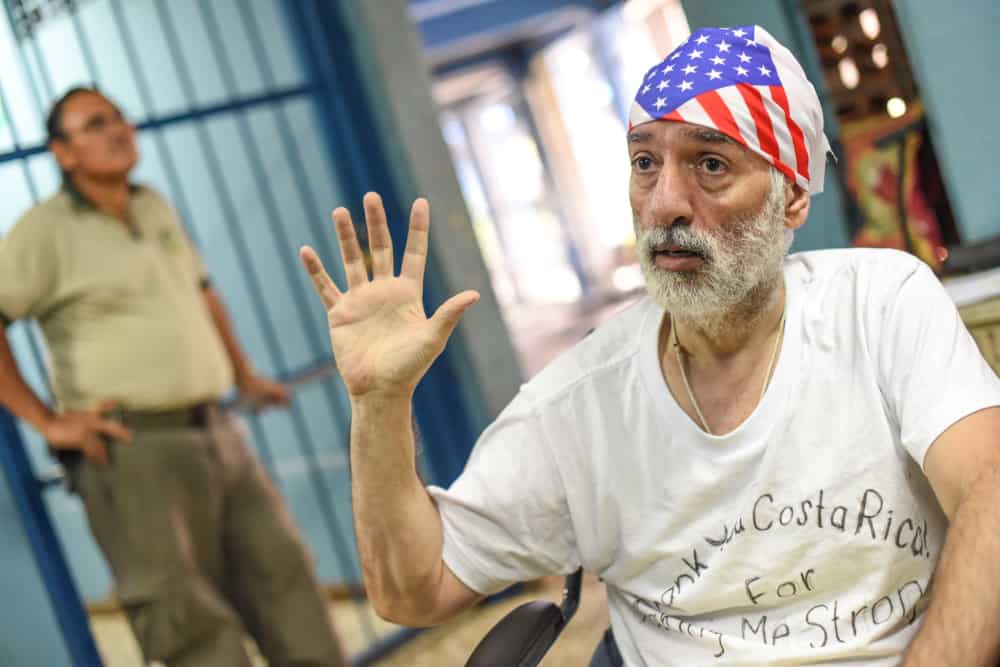While Judge Isabel Porras read out the counts against U.S. investor Cyrus Sepehr in a San José courtroom Thursday, he lowered his head to the wooden table, then lifted it back up to shout over her words.
“There is no justice in this country,” Sepehr yelled in Spanish. “I am the victim.”
After a three-week trial, judges convicted Sepehr on five counts of fraud, sentencing him to 20 years in prison for what Porras called an elaborate and structured Ponzi scheme designed to defraud fellow U.S. real estate investor Dan Kohanarieh.
“Mr. Sepehr presented himself as a good person who was economically solvent and didn’t require any investors to complete his projects,” Porras said. “The court has found the complete opposite to be true.”
In addition to a 20-year sentence, judges ruled that Sepehr must pay Kohanarieh $1 million for the “moral damages” he suffered as a result of the failed investments.
The criminal case stemmed from a complaint from Kohanarieh, a businessman from Los Angeles, Calif., who alleged that Sepehr defrauded him and other investors of $7.2 million on four failed development projects across Costa Rica. Kohanarieh and Sepehr, along with a third investor, Ali Moradshahi, supposedly purchased the four separate properties with equal shares starting in 2007.
Kohanarieh said in his Feb. 4 testimony that he now has no ownership of any of the properties in question, despite the defense arguing that all paperwork was filed legally and that Kohanarieh still has a one-third share of each piece of real estate.
Judge Juan Carlos Pérez let Kohanarieh speak again in court on Monday. Following a lengthy attack on Sepehr in which Kohanarieh referred to his former development partner as a “scam artist,” he promised the judge he would reinvest all money afforded to him by the court in Costa Rica.
“Every dollar we recuperate will be invested back into Costa Rica,” he promised Judge Pérez. “We will make every effort possible to redeem the name of Costa Rica in our own community and encourage further investments in Costa Rica.”
Kohanarieh’s team of prosecutors argued that Sepehr tainted Costa Rica’s image among foreign real estate investors.
“This sentence is extremely important for the country because it gives a clear and direct message that if someone comes to invest in Costa Rica, the justice system is going to guarantee that their transactions are done legally,” said prosecuting attorney Alejandro Rodríguez.
Sepehr, who often refers to his ordeal as being something out of a movie, gave a long defense earlier this week in which he said Kohanarieh deliberately set him up, bought out witnesses testifying at the trial and once tried to extort him. He said the partnership took a sudden turn for the worse during a June 2010 meeting at the Hotel Intercontinental, where he said Kohanarieh was waiting with several other U.S. men that Sepehr had never seen before.
According to Sepehr’s testimony, one of the men told Kohanarieh to step outside and then sat down at a table across from Sepehr. Sepehr testified that the man told him if he didn’t hand over $4 million by the end of the week, Sepehr’s family would be in danger.
Sepehr told The Tico Times that he contacted the FBI in Miami, Florida following the incident, and that after that, the men backed off.
The judges didn’t buy the story.
“Through the use of lies and his knowledge of Costa Rican law, Sepehr took advantage of Kohanarieh and his fellow investors,” Judge Isabel Porras said in court. “He assured the money they gave never got back to the victims.”
The wheelchair-bound Sepehr, who suffers from post-polio syndrome, has been in preventive prison since September. Post-polio syndrome affects polio survivors by deteriorating the muscles and paralyzing parts of the body. Sepehr’s preventive prison sentence, which was set to expire Thursday, is now extended until Aug. 16.
Despite a December ruling from the Constitutional Chamber of Costa Rica’s Supreme Court, which said that Sepehr had not been receiving sufficient medical attention for his disease in San Sebastián prison, he has remained in the prison, which is notorious for poor conditions and overcrowding.
Defense attorney Guido Nuñez told The Tico Times after Thursday’s trial that he will appeal what he called a “totally unfounded” decision.
“Giving him a sentence like this is basically a life sentence,” Nuñez said.
He said that it was clearly demonstrated in the trial that the proper transactions had been made and that Kohanarieh had received his shares of the properties.






